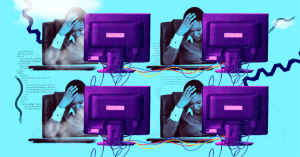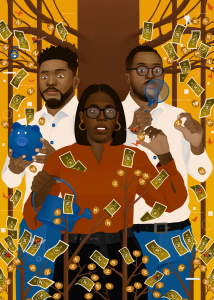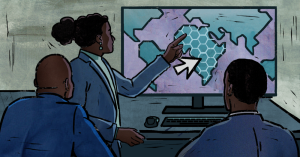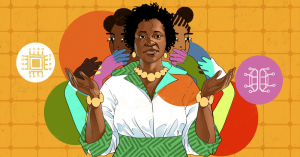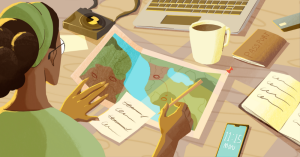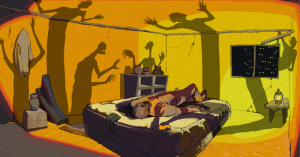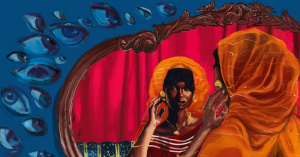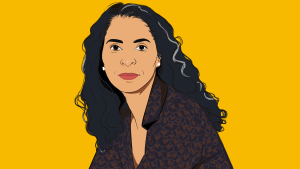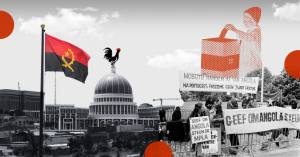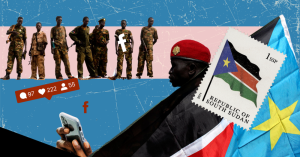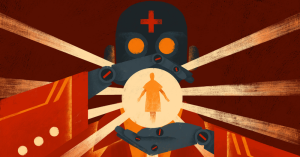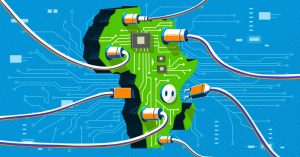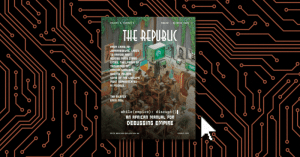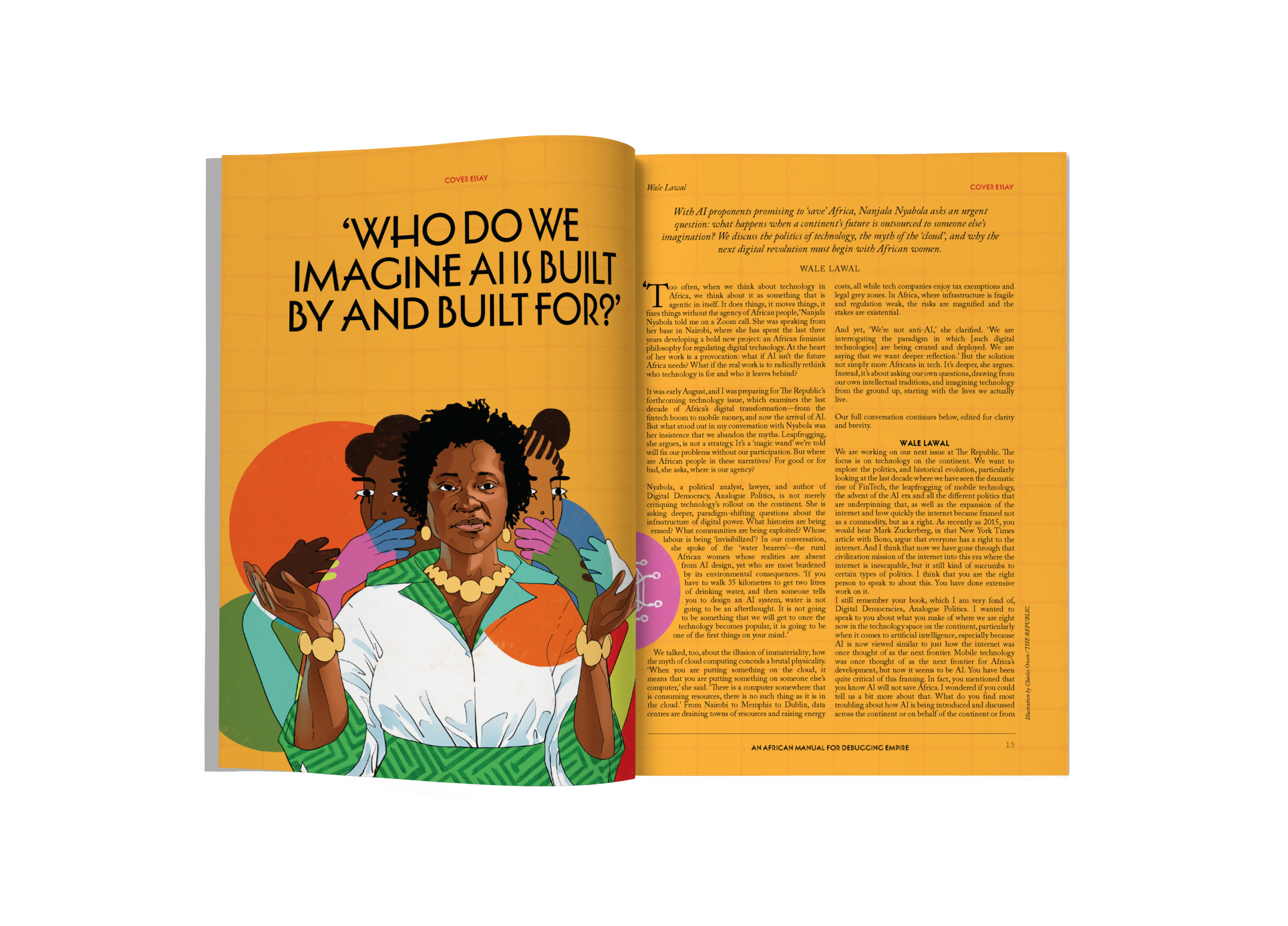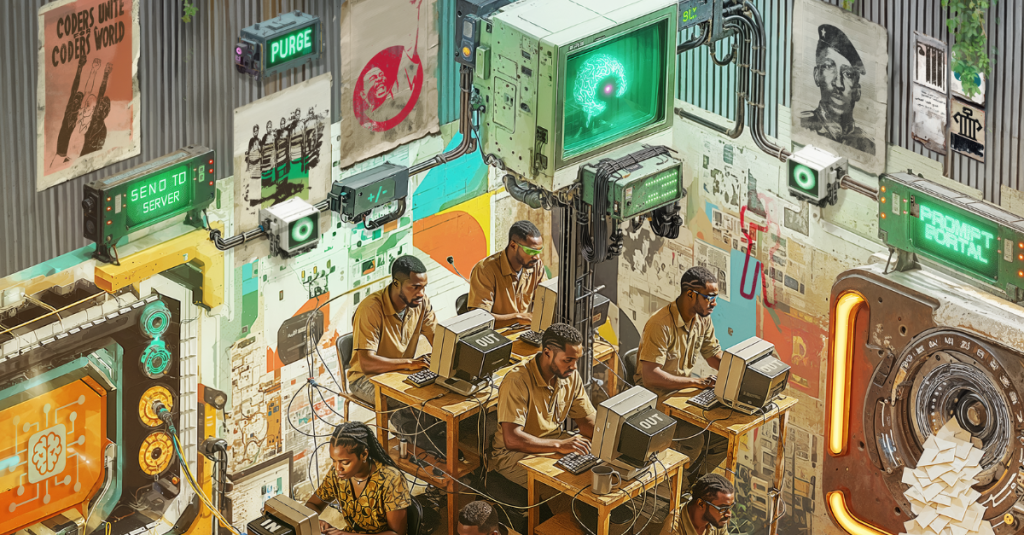
Illustration by Olalekan Jeyifous / THE REPUBLIC.
EDITOR’S FOREWORD
An African Manual for Debugging Empire
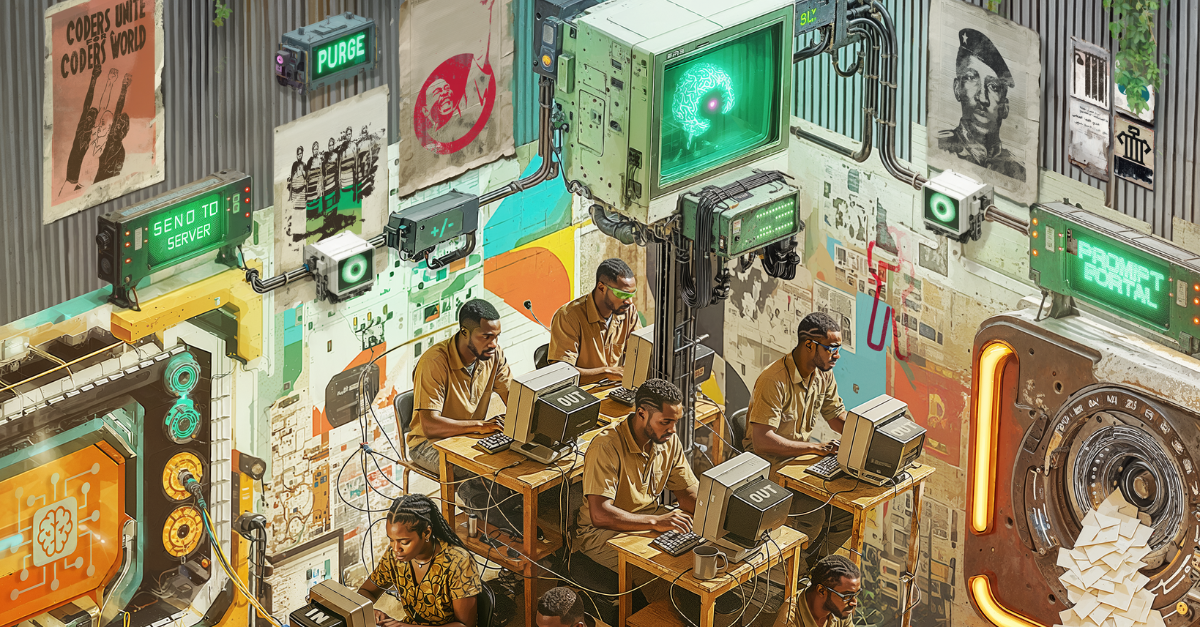
Illustration by Olalekan Jeyifous / THE REPUBLIC.
EDITOR’S FOREWORD
An African Manual for Debugging Empire
Artificial intelligence has become one of the defining technologies of our time, shaping economies, societies and the intimacies of daily life. Yet, as global debates focus on Silicon Valley breakthroughs or Chinese innovation, Africa’s place in this unfolding story is often overlooked or treated as marginal. This erasure is not accidental. It reflects longer histories of technological dependency, the undervaluing of African labour, and the persistent framing of the continent as a consumer rather than a co-creator of knowledge. To speak of Africa and AI, then, is not simply to ask what AI might ‘do’ for the continent but to insist on a broader reckoning with the asymmetries of power, representation and material resources that shape the digital present.
We’ve chosen to title this issue using a line of code. In programming, while(empire): disrupt() is a loop, a condition (to disrupt) that keeps running as long as the variable ‘empire’ exists. For us at The Republic, it’s a metaphor. A way of thinking about how power replicates itself in new forms, and why disruption, resistance and reimagining must be ongoing practices, not just events.
There’s a quiet persistence to how empire adapts; how it learns to dress itself in the language of innovation, of neutrality, of code even. In the story of Africa’s digital future, we’re often told we’ve entered a new ‘frontier’, one driven by data, automation and intelligence. But beneath the headline terms, familiar patterns remain. The extractive logic hasn’t changed—only the interface has.
With writing from Angola to South Sudan, this issue is an attempt to reckon with that tension. To ask who gets to imagine the future of technology in Africa, who gets heard, and who gets hidden. From the silent, essential and increasingly disruptive roles African workers play in data annotation (cogently captured on the cover by Olalekan Jeyifous), to the ecological burdens of energy-intensive data centres, to the geopolitical struggles over digital infrastructure, our contributors ask us to rethink Africa’s relationship to AI as one of agency rather than absence. In exploring stories of innovation, resistance and critique, they underscore that Africa is not merely at the receiving end of technological change but is actively shaping its trajectories—through local ingenuity, policy interventions and cultural philosophies that demand justice and inclusivity. In doing so, this edition not only confronts the myths of neutrality and inevitability that often accompany AI but also foregrounds Africa as central to any serious conversation about the technological futures of our world.
And now, the stories.
As AI transforms global systems, Dawn Chinagorom-Abalakam writes that, Africa remains sidelined in its design; even as its labour and resources power the very infrastructure that makes AI possible. According to Chinagorom-Abalakam, a more inclusive AI innovation and development in Africa would involve ‘moving beyond the current picture of production and labour efficiency towards progress that prioritizes people and creates technologies that supplement livelihoods, rather than undermine them.’
As Piggyvest marks its tenth anniversary, Oyindamola Depo-Oyedokun examines the revolutionary rise of the Nigerian wealth management platform in Africa’s digital economy. According to Depo-Oyedokun, ‘Word-of-mouth has arguably been the company’s biggest growth tool, as users often enthusiastically share, both online and offline, how using the app has changed their lives.’
‘Global technology dependency relies heavily on African resources such as coltan, lithium, and platinum that are essential for technological devices,’ Otobong Inieke writes. ‘As the world leans into the fourth industrial revolution, Africa has become a frontier for the geopolitical power play of China and the United States,’ he continues. ‘Amid this competition, it is critical that African countries avoid over-reliance on Euro-American or Chinese technologies but work to develop their own systems while exploring alternatives.’
Africa’s Role in the Future of Artificial Intelligence
As artificial intelligence transforms global systems, Africa remains sidelined in its design; even as its labour and resources power the very infrastructure that makes AI possible. The emergence of AI...
Saving Nigeria, the Piggyvest Way
In today’s digital age, history-making lightbulb moments don’t always strike in boardrooms or after soul-searching mountain hikes. Sometimes, they unfold casually on the X timeline. Piggyvest, now one of Africa’s...
The Geopolitics of Digital Technology in Africa
As the world leans into the fourth industrial revolution, Africa has become a frontier for the geopolitical power play of China and the United States. Amid this, African governments must...
In 2018, Kenyan writer Nanjala Nyabola published Digital Democracy, Analogue Politics. Seven years later, I caught up with her to discuss the state of African technology considering recent developments in AI, ranging from labour and resource exploitation to reports of poor working conditions. Now working on an African feminist philosophy for regulating digital technologies, Nyabola poses a crucial question: ‘If an African rural woman were designing or deploying AI, what would it look like?’
‘Who Do We Imagine AI Is Built By and Built For?’
With AI proponents promising to ‘save’ Africa, Nanjala Nyabola asks an urgent question: what happens when a continent’s future is outsourced to someone else’s imagination? We discuss the politics of technology, the myth of the ‘cloud’, and why the next digital revolution must begin with African women.
This issue also features authors writing on topics ranging from Arts & Culture to World Affairs. Our Arts section features original short stories written by Nelson Chukwu John, Ani Kayode Somtochukwu and Yasmine Zohdi. Edited by acclaimed novelist, Chigozie Obioma, John’s story, ‘To-Do List’, unfolds as a poignant catalogue of errands and goodbyes that narrate the quiet heartbreak and logistics of Nigeria’s ongoing japa wave. Through calls to friends, the weighing of luggage, the selling of furniture and unsent apologies to a once-best friend, this innovative story captures both the mundane and the deeply emotional costs of leaving. In ‘Mgbeojikwe’, Somtochukwu pens a tender, reflective meditation on the weight of expectations and traditions. The story also explores loneliness, the politics of ageing and the challenges of navigating life as an older person during a pandemic. Finally, in her short story, ‘The Absence of Stains’, Zohdi offers a reflection on faith, intimacy and selfhood. She explores how the body becomes both a vessel of desire and a site of restraint.
To-Do List
‘I woke up one day and I realized that I simply despised the smallness that life here hoists on everyone. Small loves, big needs met by small resources, small hopes...
Mgbeojikwe
‘Jikwe, why did you not marry?’ Okenwa asks, his gaze holding Mgbeojikwe’s. ‘What were you thinking?’ … ‘I could have married you,’ he says, adjusting in his seat, ‘In a...
The Absence of Stains
‘Mariam doesn’t know whether Dina’s a virgin, but if she were in her place, she now thinks—under the threat of her family finding out that she wasn’t—she would say she...
Additionally, Boluwatife Oyediran interrogates the debates about the acceptability of generative AI in art. According to Oyediran, ‘The anti-AI camp often overlooks the fact that creating art with artificial intelligence is fast, efficient, inexpensive, and readily accessible.’ While much of AI art may be considered low-quality, he continues, ‘it enables individuals with artistic sensibilities but limited traditional skills to turn their ideas into art.’
Is Rejecting AI Art Becoming a Conservative Position?
The growth of generative AI has led to debates about its acceptability in art and whether artists are being conservative for rejecting its use.
In Climate Change & the Environment, Imad Musa explores the paradox at the heart of AI: its potential to solve climate issue versus its massive energy demands that threaten to worsen the crisis. According to Musa, ‘Without local processing capacity or strict environmental governance, the continent risks being locked into a dual role as both a site of extraction and as a dumping ground for the waste generated by the global energy transition.’
Who Will Own and Control Africa’s AI Energy Future?
As Africa races to power its digital future with Chinese solar panels and AI-ready data centres, it risks becoming both the supplier of critical minerals and the dumping ground for toxic waste in a new form of green extractivism, wrapped in the language of digital and climate progress.
In Culture, Pulitzer Prize finalist and Moroccan novelist, Laila Lalami, features in our First Draft interview column. Lalami is fascinated by the extractive power of technology: ‘Techno-capitalism has infiltrated our lives to such an extent that our only real break from it comes when we sleep. I began to wonder what might happen if that kind of extractive power were applied to the world of dreams.’
‘Don’t Give Up on the Story You Want to Tell’ Laila Lalami’s First Draft
Pulitzer Prize finalist and author of The Dream Hotel, Laila Lalami, is fascinated by the extractive power of technology: ‘Techno-capitalism has infiltrated our lives to such an extent that our only real break from it comes when we sleep. I began to wonder what might happen if that kind of extractive power were applied to the world of dreams.’
In Politics, Maggie LoWilla examines how South Sudan’s digital diaspora prioritizes innovation that thrives on resilience, memory and connection across borders. According to LoWilla, ‘Diasporic actors move between resistance and reimagination: protesting the failures of a state that exiles them, while building new forms of networked belonging anchored in history, kinship, and digital exchange.’ Yet digital tools are not neutral. ‘The same platforms that amplify dissent also expose users to surveillance,’ LoWilla writes.
Additionally, Rui Verde writes on how technology is transforming the Angolan democratic landscape, manifesting as a malleable and dynamic form of democracy. While the government has historically relied on conventional means to maintain control, Verde explains that, ‘the rapid proliferation of digital platforms, social networks and encrypted communications is enabling civic engagement that is not subject to state oversight.’
Angola’s ‘Inorganic’ Techno-Democracy
In Angola, the intersection of technology and governance is forging an unconventional democratic landscape—one that emerges spontaneously and outside traditional political structures. While the regime has long maintained control through...
Wi-Fi Warriors and Homeland Dreams
In a country failed by peace agreements, connection didn’t disappear—it went online. South Sudan’s digital diaspora challenges the glossy myths of Silicon Valley and insists that innovation thrives not only...
In Science, Mobólúwajídìde Joseph profiles Nigerian pharmacist Chukwunonso Nwabufo, who is developing a device that could save lives by revealing how genes respond to drugs. ‘It is important that OneDrug is being imagined by a Black person, and by someone who grew up in West Africa. Science is often imagined to be an objective paradigm that sits above murkier ideologies like racism, sexism and other forms of discrimination,’ Joseph writes.
Additionally, Ebele Mogo envisions how AI could transform African health systems from reactive to proactive, building on both the promise and pitfalls of earlier digital health waves. ‘The future of public health lies in building systems that can learn, adapt and act—not just to treat illness, but to prevent it altogether,’ Mogo writes.
In World Affairs, Elias Gbadamosi examines how technology preserves the legacy of colonialism across Africa. Akin to how nineteenth-century colonial empires siphoned gold, rubber and cultural artifacts from their colonies, Gbadamosi writes that ‘today’s global tech corporations unethically extract raw materials used in the production of mobile telephones, computers and electric vehicles from African countries. This exploitative economic interaction perpetuates the same rapacious logic of colonial rule.’
Africa’s AI Path to Health Impact
AI is opening the door to health systems that can learn, adapt and act. Can Africa harness it to leap ahead?
The Dark Matter of Genetics
From his mother’s community chemist shop in Enugu to a Toronto lab, Nigerian pharmacist Chukwunonso Nwabufo is building a device that could save lives by revealing how your genes respond...
How Technology Preserves the Legacy of Colonialism Across Africa
The parallels between colonialism and bias in modern technology offer an instructive analysis that reveals how contemporary digital infrastructures perpetuate colonial power even as they claim to connect the world and advance social justice issues.
This issue is our third of 2025 and was developed with funding from the Open Society Foundations (OSF) and the Mellon Foundation. Since our last issue, we have also received funding from the JournalismAI Innovation Challenge supported by the Google News Initiative.
As usual, we encourage our readers to engage with our essays and articles, and to provide insightful comments. Readers may send their views directly to the editor by addressing emails (of no more than 700 words) to wale@republic.com.ng, with the subject, ‘Comment on Xyz Essay’, or ‘Letter to the Editor’ as applies. Comments and letters will be archived and, depending on the quality of the arguments presented, we may reach out to assist in developing your letters and comments further for publishing in the magazine.
At The Republic, we will always prioritize the meaningful exchange of ideas. We commit to pressing forward: on the most critical of social, political and economic issues; by innovating through knowledge gaps; and by providing guidance through thickets of opinion, ignorance and misinformation—three key features of our time—in search of glades of insight⎈




